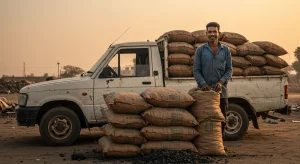Africa is a continent full of opportunities, especially for entrepreneurs who are ready to think outside the box or even embrace what others consider “dirty” work. Contrary to popular belief, some of the most profitable businesses aren’t always glamorous. In fact, many lucrative ventures involve sanitation, waste, cleaning, and raw materials.
In this article, we’ll explore five unconventional but highly profitable businesses you can start in Africa, businesses that not only solve real problems but also offer substantial financial returns. Whether you’re looking to invest, start your own company, or simply understand the entrepreneurial landscape in Africa, these ideas will open your eyes to the power of practical thinking and market gaps.
Let’s dive in!
1. Toilet Business: Solving Sanitation Needs with Profit Potential
Why It Works:
Sanitation remains a major challenge across many African cities and rural areas. Public restrooms are either non-existent or poorly maintained, creating an urgent need for clean, accessible toilets. This presents a unique opportunity for entrepreneurs willing to step into the sanitation space.
How to Start:
– Identify High-Traffic Locations: Think bus stations, markets, schools, and slum areas where access to clean toilets is limited.
– Build Basic Toilets: You don’t need luxury facilities, just clean, functional bathrooms.
– Mobile Toilets for Events: Offer portable toilets for weddings, funerals, festivals, and corporate events. These are in high demand and can be rented out daily.
Monetization Strategy:
– Charge per use.
– Offer monthly subscriptions for regular users.
– Rent mobile toilets at events for a premium rate.
2. Garbage Collection Business: Turning Trash into Treasure**
Why It Works:
Waste management is a growing issue in African urban centers. With rapid urbanization and population growth, garbage collection has become essential and profitable.

How to Start:
– Secure Permits: Contact local municipal authorities to get legal permission to operate.
– Acquire Tri-Cycles or Trucks: Start small with one or two tricycles and expand as demand grows.
– Hire Local Workers: Employ locals to collect refuse from households and businesses daily.
Monetization Strategy:
– Monthly subscription fees for households and offices.
– Contract-based services for commercial buildings or apartment complexes.
– Recycling partnerships — sell recyclables like plastic, metal, and paper.
3. Cleaning Services: From Laundry to Office Cleaning
Why It Works:
The demand for professional cleaning services is rising in African cities. Busy professionals, expatriates, and office managers often prefer outsourcing cleaning tasks.
Types of Cleaning Services:
– Laundry Services: Wash, dry, and iron clothes for individuals and hotels.
– Office Cleaning: Provide daily janitorial services for companies and co-working spaces.
– Event Cleaning: Clean venues after large gatherings or parties.
How to Start:
– Rent a small shop or start from home.
– Use social media platforms like Facebook, Instagram, and WhatsApp to advertise your services.
– Build trust through customer reviews and word-of-mouth referrals.
Monetization Strategy:
– Charge by weight for laundry services.
– Offer weekly or monthly contracts for office cleaning.
– Provide premium services like same-day delivery or fabric care consultations.
4. Charcoal Business: Fueling Demand Locally and Globally
Why It Works:
Charcoal remains a primary cooking fuel source in many African countries. Beyond domestic use, there’s a growing export market, especially to the Middle East and Europe.

How to Start:
– Source Locally: Partner with villages or forest communities where charcoal production is already happening.
– Buy in Bulk, Sell in Cities: Transport charcoal to urban centers where demand is high.
– Become an Export Agent: Connect producers with international buyers via online platforms.
Monetization Strategy:
– Sell bags of charcoal in local markets or directly to restaurants and households.
– Export in large containers to international buyers.
– Add value by packaging and branding your charcoal products.
5. Palm Oil Business: Capitalizing on Seasonal Demand
Why It Works:
Palm oil is a staple in African cuisine and a major export commodity. Its price fluctuates seasonally, offering savvy traders the chance to buy low and sell high.
How to Start:
– Buy During Off-Peak Seasons: January to March is typically off-season; prices are lower.
– Store Safely: Invest in quality storage tanks to preserve the oil until peak season (August–September).
– Brand Your Product: Create your own label and packaging to build brand recognition.
– Use Social Media: Promote your product on platforms like Facebook, TikTok, and WhatsApp.
Monetization Strategy:
– Sell directly to households, restaurants, and street vendors.
– Supply wholesale to supermarkets and grocery stores.
– Export crude or refined palm oil to neighboring countries or international buyers.
Why These “Dirty” Businesses Work So Well in Africa
Market Gaps Exist Everywhere:
Many of these businesses fill critical voids in infrastructure, sanitation, and basic services. By addressing real community needs, they ensure consistent demand.
Low Entry Barriers:
Most of these businesses require minimal startup capital. You don’t need advanced degrees or high-tech equipment — just initiative and resourcefulness.
High Return on Investment (ROI):
These industries are under-served, meaning competition is low and margins are high. With smart planning, you can scale quickly.
Opportunity for Innovation:
Technology and digital tools (like WhatsApp marketing, GPS tracking for waste trucks, or e-commerce for palm oil sales) can give your business an edge.
Tips for Success in Any of These Businesses
1. Start Small, Scale Smart
Don’t over-invest early. Test your idea in a small location before expanding.
2. Focus on Customer Experience
Even in “dirty” businesses, hygiene, reliability, and customer service matter.
3. Use Social Media Wisely
Platforms like Facebook and Instagram are powerful tools for marketing and customer engagement.
4. Network with Local Authorities and Communities
Getting permits, understanding local needs, and building trust are key to long-term success.
5. Stay Legal and Compliant
Always follow local laws and regulations, especially when dealing with sanitation, waste, and exports.
6. Track Finances Carefully
Keep accurate records of expenses, profits, and reinvestment plans.
Conclusion: Money Hides in the Dirt – Will You Dig?
In Africa, success often goes to those who are willing to do what others won’t. The five businesses discussed above, toilet services, garbage collection, cleaning, charcoal, and palm oil, may not sound glamorous, but they are real, profitable, and scalable.
Whether you’re an aspiring entrepreneur, a job seeker looking to create your own income stream, or an investor scouting for untapped markets, these “dirty” businesses represent a golden opportunity.
So, roll up your sleeves, get creative, and remember: money hides in the dirt and it rewards those brave enough to dig.














